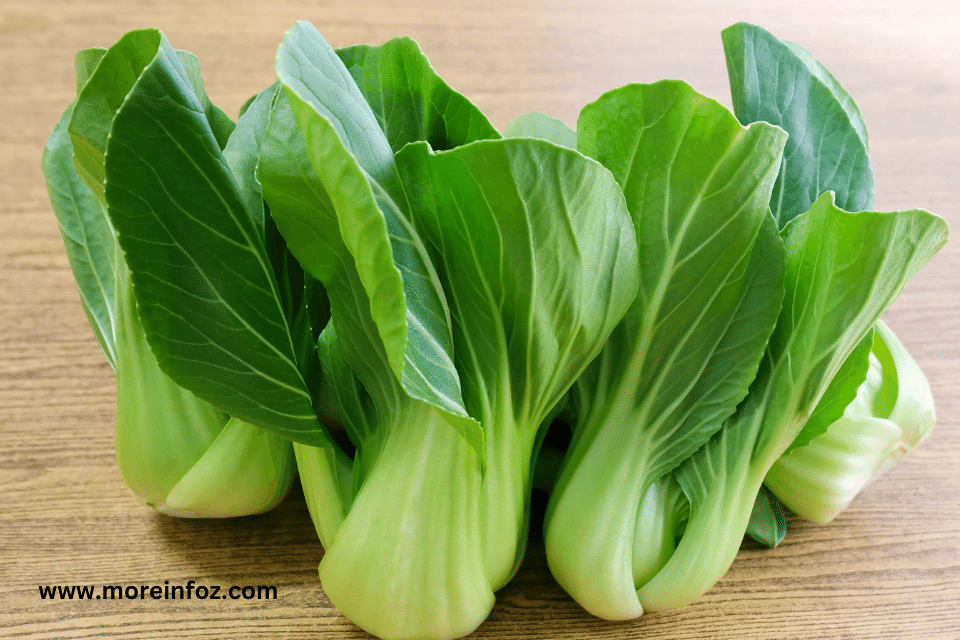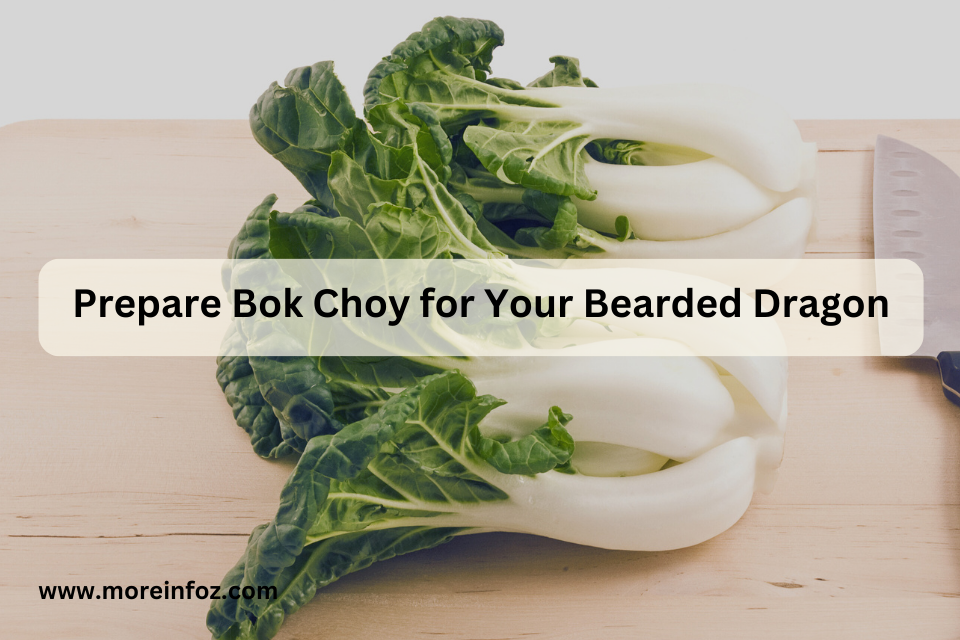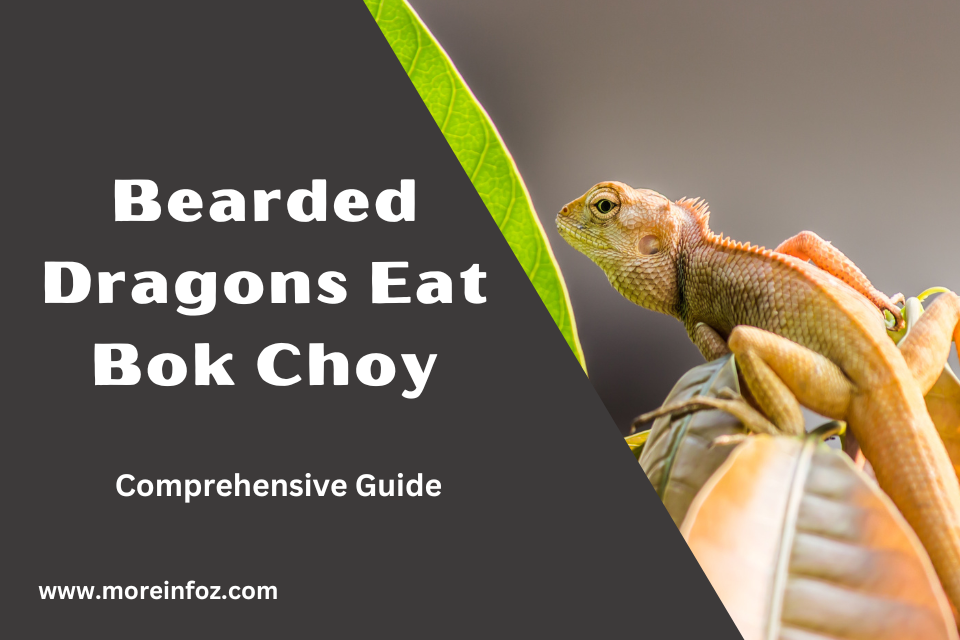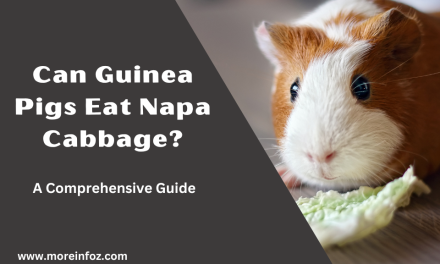Bearded dragons are known for their diverse diet which includes a variety of vegetables, fruits, and insects. However, not all vegetables are safe for them to consume. One such vegetable is bok choy. In this article, we will explore whether bearded dragons can eat bok choy and if it provides any nutritional benefits.
Bok choy, also known as Chinese cabbage, is a leafy green vegetable commonly used in Asian cuisine. While it is a nutrient-dense vegetable for humans, it is not recommended for bearded dragons. Bok choy contains high levels of oxalates, which can bind with calcium and prevent its absorption, leading to metabolic bone disease in bearded dragons. As a result, feeding bok choy to bearded dragons can cause serious health issues. However, there are other vegetables that bearded dragons can safely consume that provide similar nutritional benefits.
Understanding Bearded Dragons’ Dietary Needs
Bearded dragons are omnivores, meaning they eat both plant and animal matter. In the wild, they consume a variety of insects, vegetables, and fruits. As pets, it’s important to provide them with a balanced diet that meets their nutritional needs.
One of the key components of a bearded dragon’s diet is leafy greens. These should make up around 20% of their food intake. Bok choy is a type of leafy green that can be a good addition to their diet. It’s high in vitamins A and C, as well as calcium.
However, it’s important to note that bearded dragons have specific dietary requirements. They need a good balance of calcium and phosphorus in their diet, with a calcium-to-phosphorus ratio of 2:1. Bok choy has a high calcium content, but it also contains goitrogens, which can interfere with the absorption of calcium.
To ensure that your bearded dragon is getting the right nutrition, it’s important to offer a variety of foods and to supplement their diet with calcium and vitamin D3. You can also consult with a veterinarian or reptile nutritionist to ensure that your bearded dragon’s dietary needs are being met.
Overall, while bok choy can be a nutritious addition to a bearded dragon’s diet, it should be offered in moderation and as part of a balanced diet that meets their specific nutritional needs.
Can Bearded Dragons Eat Bok Choy

Bok choy is a type of Chinese cabbage that is becoming increasingly popular in the United States. It is a nutritious vegetable that is low in calories and high in vitamins and minerals. But can bearded dragons eat bok choy? In this section, we will discuss the nutritional value of bok choy and the potential risks and benefits of feeding it to your bearded dragon.
Nutritional Value of Bok Choy
Bok choy is a good source of many vitamins and minerals that are important for your bearded dragon’s health. Here are some of the key nutrients found in bok choy:
- Vitamin A: Bok choy is high in vitamin A, which is important for maintaining healthy skin and eyesight.
- Vitamin C: Bok choy is also a good source of vitamin C, which is important for boosting the immune system.
- Calcium: Bok choy contains calcium, which is important for maintaining strong bones and teeth.
- Iron: Bok choy is a good source of iron, which is important for maintaining healthy blood.
Potential Risks and Benefits
Feeding your bearded dragon bok choy can have both risks and benefits. Here are some things to consider:
- Benefits: Bok choy is a nutritious vegetable that can provide your bearded dragon with important vitamins and minerals.
- Risks: Bok choy contains goitrogens, which can interfere with thyroid function. If fed in large amounts, bok choy can cause hypothyroidism in bearded dragons. Additionally, bok choy contains oxalates, which can bind to calcium and prevent its absorption. This can lead to metabolic bone disease in bearded dragons.
In conclusion, bok choy can be a nutritious addition to your bearded dragon’s diet, but it should be fed in moderation. If you choose to feed your bearded dragon bok choy, make sure to wash it thoroughly and remove any parts that may be difficult to digest. As with any new food, introduce bok choy slowly and monitor your bearded dragon for any adverse reactions.
How to Prepare Bok Choy for Your Bearded Dragon

When offering bok choy to your bearded dragon, it’s important to prepare it properly to ensure that it’s safe and healthy for them to eat. Here’s how we recommend preparing bok choy for your bearded dragon:
- Wash the bok choy thoroughly to remove any dirt or debris.
- Cut the bok choy into small, bite-sized pieces that are easy for your bearded dragon to eat.
- Remove any tough or fibrous stems, as these can be difficult for your bearded dragon to digest.
- Cook the bok choy by steaming or boiling it until it’s soft and tender. This will make it easier for your bearded dragon to digest and absorb the nutrients.
- Allow the bok choy to cool before offering it to your bearded dragon.
It’s important to note that while bok choy is generally safe for bearded dragons to eat, it should be offered in moderation as part of a balanced diet. Too much bok choy can lead to digestive issues and other health problems.
When feeding bok choy to your bearded dragon, it’s also important to monitor their behavior and health to ensure that they’re tolerating it well. If you notice any signs of digestive upset or other health issues, consult with a veterinarian who specializes in reptile care.
Alternatives to Bok Choy for Bearded Dragons
If you’re looking for alternative vegetables to feed your bearded dragon instead of bok choy, there are plenty of options to choose from. It’s important to remember that bearded dragons require a variety of vegetables to maintain a healthy diet, so it’s a good idea to mix things up and offer different options.
Here are some alternative vegetables that are safe and healthy for bearded dragons:
- Collard Greens: These greens are a great source of calcium and Vitamin A, which are both important for bearded dragons. They’re also low in oxalates, which can be harmful in large quantities.
- Mustard Greens: Similar to collard greens, mustard greens are also rich in calcium and Vitamin A. They have a slightly stronger flavor than collard greens, so your bearded dragon may need some time to adjust to them.
- Turnip Greens: Turnip greens are another good source of calcium and Vitamin A. They also contain Vitamin K, which helps with blood clotting.
- Endive: Endive is a leafy green that’s low in oxalates and high in fiber. It’s also a good source of Vitamin C, which helps with immune function.
- Escarole: Escarole is another leafy green that’s low in oxalates and high in fiber. It’s also a good source of Vitamin A and potassium.
Remember to always wash your vegetables thoroughly before feeding them to your bearded dragon. It’s also a good idea to offer a variety of vegetables to ensure that your bearded dragon is getting all the nutrients it needs.
Conclusion
Based on our research and analysis, we can confidently say that bearded dragons can eat bok choy. It is a safe and healthy vegetable that can be included in their diet.
Bok choy is a good source of vitamins and minerals that are essential for the growth and development of bearded dragons. It contains high levels of calcium, potassium, and vitamin C, which are all important for maintaining strong bones, healthy muscles, and a strong immune system.
However, it is important to note that bok choy should not be the only vegetable in a bearded dragon’s diet. It should be included as part of a balanced and varied diet that includes a range of vegetables and fruits.
When feeding bok choy to bearded dragons, it is important to prepare it properly. It should be washed thoroughly to remove any dirt or debris and chopped into small pieces to make it easier for them to eat. It can be served raw or cooked, but it is important to avoid adding any seasoning or spices.
In summary, bok choy is a safe and healthy vegetable that can be included in a bearded dragon’s diet. As with any food, it should be fed in moderation and as part of a balanced and varied diet.
Frequently Asked Questions
What greens can bearded dragons eat everyday?
Bearded dragons can eat a variety of greens every day, such as collard greens, mustard greens, and dandelion greens. These greens are high in nutrients and low in oxalates, which can interfere with calcium absorption.
What fruits can bearded dragons eat?
Bearded dragons can eat fruits in moderation, such as papaya, mango, and raspberries. These fruits are high in vitamins and minerals and provide a good source of hydration. However, fruits should not make up a large part of a bearded dragon’s diet.
Can bearded dragons eat turnip greens?
Yes, bearded dragons can eat turnip greens. Turnip greens are a nutritious leafy green that is high in calcium and vitamin A. However, they should be fed in moderation due to their high oxalate content.
Can bearded dragons eat cilantro?
Yes, bearded dragons can eat cilantro. Cilantro is a safe herb that is high in vitamin C and antioxidants. However, it should be fed in moderation as part of a varied diet.
What vegetables can bearded dragons eat?
Bearded dragons can eat a variety of vegetables, such as carrots, squash, and bell peppers. These vegetables are high in nutrients and provide a good source of hydration. However, they should be fed in moderation and should not make up a large part of a bearded dragon’s diet.
Can bearded dragons eat green beans?
Yes, bearded dragons can eat green beans. Green beans are a safe vegetable that is high in fiber and vitamin C. However, they should be fed in moderation as part of a varied diet.





